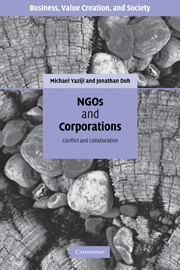Book contents
- Frontmatter
- Contents
- List of figures
- List of tables
- Preface
- Foreword
- Acknowledgments
- Part I Understanding NGOs
- 1 Classifying NGOs: definitions, typologies and networks
- 2 The emergence of NGOs in the context of business–government–societal relationships
- 3 The emergence of NGOs in the context of ethical and institutional complexity
- Case illustration: genetically modified organisms, social movements and NGOs
- Case illustration: protecting the people – environmental NGOs and TXU Energy
- Part II NGO advocacy campaigns
- Part III Corporate–NGO engagement
- Part IV The future of corporate–NGO relations
- Index
- References
1 - Classifying NGOs: definitions, typologies and networks
Published online by Cambridge University Press: 13 January 2010
- Frontmatter
- Contents
- List of figures
- List of tables
- Preface
- Foreword
- Acknowledgments
- Part I Understanding NGOs
- 1 Classifying NGOs: definitions, typologies and networks
- 2 The emergence of NGOs in the context of business–government–societal relationships
- 3 The emergence of NGOs in the context of ethical and institutional complexity
- Case illustration: genetically modified organisms, social movements and NGOs
- Case illustration: protecting the people – environmental NGOs and TXU Energy
- Part II NGO advocacy campaigns
- Part III Corporate–NGO engagement
- Part IV The future of corporate–NGO relations
- Index
- References
Summary
The business–society interface has changed over the last decades of the twenty-first century as disparate interests within civil society have coalesced around an increasingly vocal – and powerful – nongovernmental or “third” sector. Nongovernmental organizations (NGOs) – the organizational manifestation of this movement – have gained considerable influence in government, business and within broader society. A coherent understanding of NGOs is a necessary precondition for proper consideration not only of their activities and influence, but also of the nature of the corporate–NGO interactions. In this chapter, we provide a definition of NGOs, a typology for conceptualizing the different varieties of NGOs, and discuss the importance of networks and coalitions to NGOs.
Definitions of NGOs
Although the term NGO is relatively recent, associations among like-minded individuals have been part of both ancient and modern history. When Tocqueville first visited the United States, he was struck by the fact that:
Americans of all ages, all stations of life and all types of disposition are forever forming associations … In democratic countries knowledge of how to combine is the mother of all other forms of knowledge; on its progress depends that of all the others. There are not only commercial and industrial associations in which all take part, but others of a thousand different types – religious, moral, serious, futile, very general and very limited, immensely large and very minute … Nothing, in my view, deserves more attention than the intellectual and moral associations in America.
- Type
- Chapter
- Information
- NGOs and CorporationsConflict and Collaboration, pp. 3 - 14Publisher: Cambridge University PressPrint publication year: 2009
References
- 2
- Cited by

